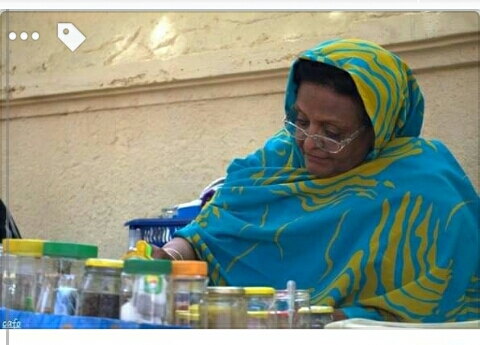Calls to address sexual violence in Darfur, El Burhan orders investigation into ‘war crimes’

Ihsan Fagiri, head of the No to Women Oppression Initiative working as a tea vendor in Omdurman, December 2020 (Social media)
The Women’s Future Organisation has recorded 103 incidents of rape in South and West Darfur since the outbreak of war between the Sudanese army and the Rapid Support Forces (RSF) on April 15. Army Commander Gen Abdelfattah El Burhan on Friday decided to form a commission of inquiry on war crimes.
According to Nahla El Khazraji, director of the South Darfur NGO for women development, 24 victims of the documented 103 rapes received treatment.
Several survivors declined treatment. “They fear stigmatisation should their cases be revealed,” she told Radio Dabanga. “People in Darfur tend to trust women NGOs more than governmental organisations because of their discreet data handling, respect for privacy, and confidentiality practices.”
The director confirmed that RSF soldiers and allied gunmen are responsible for most of the rape cases recorded in South and West Darfur, but she made a differentiation between two types of RSF paramilitaries: “There are disciplined RSF soldiers that follow the laws of the RSF, and there are the janjaweed who operate under RSF’s auspices and are involved in killing and plundering.”
Concerning the many cases of sexual violence documented in El Geneina, West Darfur, she said that they were clearly “targeted against certain tribes, to violate the dignity of the women, families, and communities of these tribes.” She added that the organisation recorded 73 cases of sexual assaults in West Darfur despite a communication blackout since May.
El Khazraji called on human rights organisations to urgently intervene and establish a special protocol for women and girls. “The effects of sexual violence are long-lasting and can impact generations. Survivors require psychological support, therapy, and economic empowerment to aid in their recovery,” she said, lamenting the fact that “support centres for survivors of sexual violence are lacking in the five states of Darfur”.
She further highlighted the challenges faced by women human rights defenders in Darfur, including the lack of protection and exposure to threats of murder and rape to silence their monitoring efforts.
“The lack of police officers and well-equipped posts in Darfur has contributed to difficulties in filing official complaints and identifying suspects,” the women activist added. “Moreover, the often-insufficient medical evidence weakens cases and allows offenders to escape punishment.”
War crimes
Gen Abdelfattah El Burhan, SAF commander and Sovereignty Council chair, on Friday decided to form a commission of inquiry on war crimes allegedly committed by the RSF.
The commission is to be headed by a representative of the Attorney General. Representatives of the Ministry of Justice, Ministry of Foreign Affairs, the SAF, the police, the General Intelligence Service and the National Commission for Human Rights will serve as members.
Its tasks consist of listing all human rights violations and crimes “committed by the rebel RSF since April 15”, and to take legal measures “against the leaders and members of the rebel forces internally and externally, and anyone proven to be involved in participation, incitement or assistance [in committing these crimes]”.
Various legal experts and lawyers have criticised the decision and cite “a lack of independence and impartiality due to its formation by one of the parties to the war”.
Legal expert Saleh Mahmoud expressed surprise that the decision was issued by a party involved in the human rights violations. “El Burhan excluded the SAF and the forces of the Islamic Movement within the army from the investigation,” he told Radio Dabanga.
“The decision should have included all crimes committed by both warring parties, so also the bombing of residential areas which killed already many people.”
On Saturday, Radio Dabanga reported that the Sudanese public prosecutor filed criminal cases against the RSF for enforced disappearances and sexual assaults.
The move followed a meeting of Pramila Patten, the UN Special Representative on Sexual Violence in Conflict, with Abdelrahim Dagalo, deputy commander of the RSF on Tuesday last week, during which she “raised serious concerns about increasing sexual violence in Khartoum and Darfur, including cases implicating arms bearers affiliated with the RSF”.
On Thursday, Amnesty International accused members of both RSF and SAFof committing war crimes in a new report.
The report, which focuses primarily on Khartoum and West Darfur, details sexual violence against women and girls, targeted attacks on civilian objects such as hospitals and churches, and extensive looting since the outbreak of the war.
Vendor ban
The No to Women’s Oppression initiative has opposed the decision of authorities in Wad Madani, capital of El Gezira, to prohibit vendors from working on the El Nil road in the city.
“Fifteen women and four men had their work tools confiscated, and they await court proceedings without being provided any official documentation or explanation of the financial fines imposed on them,” the initiative said in a statement yesterday.
“Such actions against working women are contrary to their constitutional rights”. The primary role of the police “should be to protect residents, rather than repression or failing to address abuses when notified.”
The No to Women’s Oppression initiative said it continues to be committed “to combating injustice faced by women and marginalised social groups” in Sudan.











 and then
and then